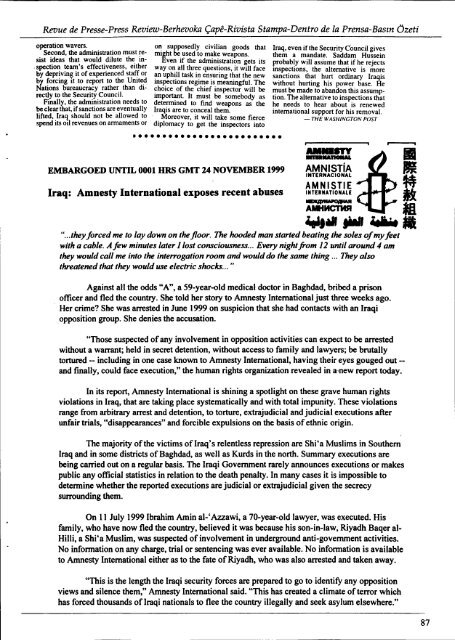Bulletin de liaison et d'information - Institut kurde de Paris
Bulletin de liaison et d'information - Institut kurde de Paris
Bulletin de liaison et d'information - Institut kurde de Paris
You also want an ePaper? Increase the reach of your titles
YUMPU automatically turns print PDFs into web optimized ePapers that Google loves.
Revue <strong>de</strong> Presse-Press Review-Berhevoka Çapê-Rivista Stampa-Dentro<br />
<strong>de</strong> la Prensa-Basm Oz<strong>et</strong>i<br />
operation wavers.<br />
Second, the administration must resist<br />
i<strong>de</strong>as that would dilute the in-<br />
,spection team's effectiveness, either<br />
by <strong>de</strong>priving it of experienced staff or<br />
by forcing it to r~port to the United<br />
Nations bureaucracy rather than directly<br />
to the Security Council.<br />
Finally, the administration needs to<br />
be clear that, if sanctions are eventually<br />
lifted, Iraq should not be allowed to<br />
spend its oil revenues on armaments or<br />
on supposedly civilian goods that<br />
might be used to make weapons.<br />
Even if the administration g<strong>et</strong>s its<br />
way on aU three questions, it will face<br />
an uphill task in ensuring that the new<br />
inspections regime is meaningful. The<br />
choice of the chief inspector will be<br />
important. It must be somebody as<br />
<strong>de</strong>termined to find weapons as the<br />
Iraqis are to conceal them.<br />
Moreover, it will take some fierce<br />
diplomacy to g<strong>et</strong> the inspectors into<br />
•••••••••••••••••••••••••<br />
Iraq, even it'the Security Council gives<br />
them a mandate. Saddam Hussein<br />
probably will ass'ume that if he rejects<br />
inspections, the alternative is more<br />
sanctions that hurt ordinary Iraqis<br />
without hurting his power base. He<br />
must be ma<strong>de</strong> to abandon this assumption.<br />
The alternative to inspections that<br />
he needs to hear about is renewed<br />
international support for his removal.<br />
- THE WASHINGTON POST<br />
............<br />
AM.nY<br />
EMBARGOED UNTIL 0001 URS GMT 24 NOVEMBER 1999 AMNISTIA<br />
INTERNACIONAL Ülit<br />
Iraq: Amnesty International exposes recent abuses<br />
AMNISTIE<br />
INTERNATIONALE<br />
1"«t<br />
fi<br />
~<br />
A~MCnUI<br />
..... Jill w.. JI<br />
"...they forced me to lay down on the floor. The hoo<strong>de</strong>d man started beating the soles of my fe<strong>et</strong><br />
with a cable. A few minutes later I lost consciousness ... Every night from 12 until around 4 am<br />
they would call me into the interrogation room and would do the same thing ... Theyalso<br />
threatened that they would use electric shocks ... "<br />
Against all the odds "A", a 59-year-old medical doctor in Baghdad, bribed a prison<br />
officer and fled the country. She told her story to Amnesty International just three weeks ago.<br />
Her crime? She was arrested in June 1999 on suspicion that she had contacts with an Iraqi<br />
opposition group. She <strong>de</strong>nies the accusation.<br />
"Those suspected of any involvement in opposition activities can expect to be arrested<br />
without a warrant; held in secr<strong>et</strong> <strong>de</strong>tention, without access to family and lawyers; be brutally<br />
tortured -- including in one case known to Amnesty International, having their eyes gouged out --<br />
and finally, could face execution," the human rights organization revealed in a.new report today.<br />
In its report, Amnesty International is shining a spotlight on these grave human rights<br />
violations in Iraq, that are taking place systematically and with total impunity. These violations<br />
range from arbitrary arrest and <strong>de</strong>tention, to torture, extrajudicial and judicial executions after<br />
unfair trials, "disappearances" and forcible expulsions on the basis of <strong>et</strong>hnic origin.<br />
The majority of the victims oflraq's relentless repression are Shi'a Muslims in Southern<br />
Iraq and in some districts of Baghdad, as well as Kurds in the north. Summary executions are<br />
being carried out on a regular basis. The Iraqi Government rarely announces executions or makes<br />
public any official statistics in relation to the <strong>de</strong>ath penalty. In many cases it is impossible to<br />
<strong>de</strong>termine wh<strong>et</strong>her the reported executions are judicial or extrajudicial given the secrecy<br />
surrounding them.<br />
On Il July 1999 Ibrahim Amin al-' Azzawi, a 70-year-old lawyer, was executed. His<br />
family, who have now fled the country, believed it was because his son-in-law, Riyadh Baqer al-<br />
HilIi, a Shi'a Muslim, was suspected of involvement in un<strong>de</strong>rground anti-government activities.<br />
No information on any charge, trial or sentencing was ever available. No information is available<br />
to Amnesty International either as to the fate of Riyadh, who was also arrested and taken away.<br />
"This is the length the Iraqi security forces are prepared to go to i<strong>de</strong>ntify any opposition<br />
views and silence them," Amnesty International said. "This has created a climate of terror which<br />
has forced thousands oflraqi nationals to flee the country illegally and seek asylum elsewhere."<br />
Il<br />
fi<br />
87

















